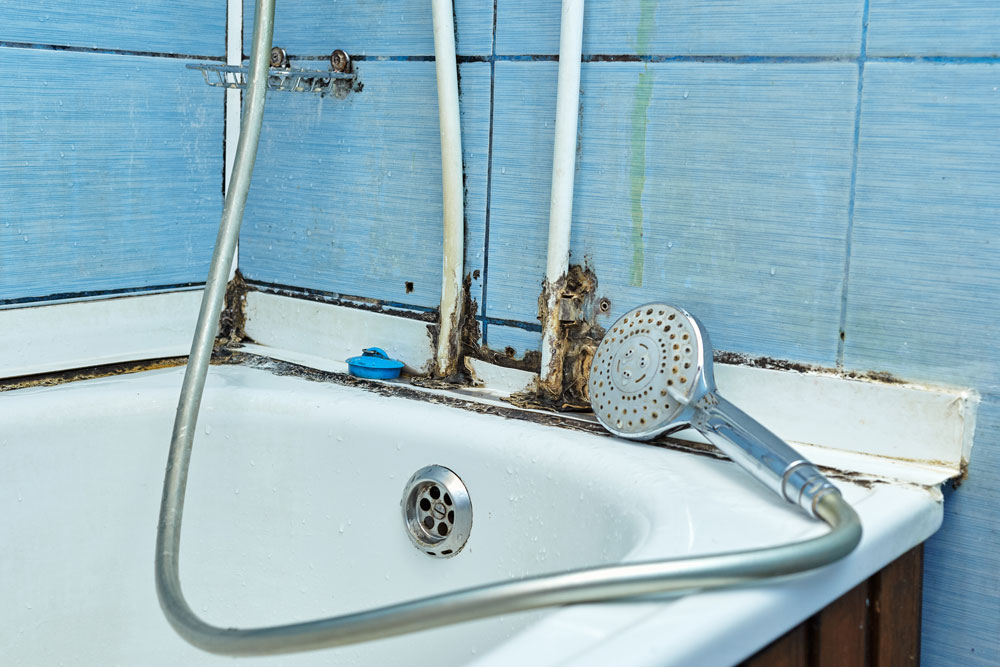How To Get Rid Of Mould In The Shower
 CONTENTS
CONTENTS
- What causes mould to grow in the shower?
- The dangers of mould exposure
- How to remove mould from the shower
- How to prevent mould growing in the shower
- Get in touch today
Mould is a very common problem in the bathroom thanks to its warm, humid conditions. This is not just a cosmetic or foul-smelling issue, however. Regular exposure to mould can put your health at risk, particularly if its black mould.
Here at ICE Cleaning, our technicians provide rapid, effective mould remediation services. They can treat both visual mould spores on surfaces and airborne mould spores to ensure all traces have been eliminated from your home. We operate nationwide, 24/7, 365 days a year.
Read on to find out how to remove mould from your shower.
What causes mould to grow in the shower?
Mould is a type of fungus caused by excess moisture. It can be triggered by condensation, leaks, poor airflow, and high humidity. Bathrooms – and showers in particular - usually provide it with the optimal conditions to grow:
- Lots of steam builds up when washing and showering
- Water gets splashed onto surfaces
- Humidity can be trapped there if windows are kept shut or there are no extractor fans
- Condensation forms when warm air meets cold surfaces, like the ceiling
The most types of mould that normally grows in bathroom include aspergillus niger (black mould), aspergillus flavus (yellow mould), and aspergillus fumigatus (green mould). All can emit dangerous toxic substances and be harmful to your health.
Grout is especially vulnerable to mould growth as it traps moisture and stays damp for a very long time. You may also find black mould on your shower sealant if there are any gaps in it. Water can get behind the silicone and mould can grow there before spreading to the front of the sealant.
Mould on the shower curtain is common, as well. If not spread out and dried properly afterwards, it can be damp for a long period of time. You can learn out more about removing mould from a shower curtain in this blog.
The dangers of mould exposure
Mould releases allergens, irritants, and sometimes toxins. Ingesting, inhaling, and touching the spores can cause an allergic reaction such as sneezing, coughing, and a skin rash. It can even trigger asthma attacks.
Certain groups are more vulnerable to mould like elderly people, infants, and people with respiratory conditions or a weakened immune system.
Given how often we use the bathroom, mould in your shower is especially harmful as you are likely to be in danger of prolonged exposure to it. As soon as you spot the first signs of it, you must bring in professional cleaners to remove it and make the room safe again.
How to remove mould from the shower
There might be lots of home remedies online for tackling mould in your home that recommend using products like bleach, alcohol, and vinegar, but it must be left to specialist mould cleaners.
Some cleaning products, like bleach, can be dangerous to use without personal protective equipment (PPE) and could burn your skin, eyes, nose, and lungs. Should you incorrectly mix it with another chemical, it could produce toxic gases.
These cleaning remedies and products are also often ineffective and may not remove all the mould. Any traces left behind can continue to grow and the mould problem will soon return.
Scrubbing the mould can release the spores into the air which you might inhale, too. Given how close you will need to come to the mould to clean it, you are very likely to touch, inhale, and ingest the spores, as well.
Professional cleaners, like our technicians, have the training, specialist products and equipment, and PPE to deal with mould safely and effectively. They have plenty experience with mould removal in the shower and can even diagnose the specific cause of it to advise on how to stop it in the future.
How to prevent mould growing in the shower
- Dry surfaces after showering to eliminate any excess moisture
- Regularly clean the bathroom to remove any dust, bacteria, and other organic material that mould feeds off
- Ensure the bathroom is well ventilated by opening a window following washing and showering, or install a fan to reduce humidity
- Keep the shower cabinet door open to stop humid air getting trapped behind it
- Make sure your bathroom is heated to help it dry out faster
- Spread your shower curtain out following a shower to ensure it dries out fully
- Don’t leave wet towels on the floor – hang them up on a rack to dry
Get in touch today
Our technicians have been accredited by Dewpoint Professional and can improve the air quality significantly in your home. Every service comes with a lifetime guarantee*, too, so you can be sure your property will stay mould-free in the future.
Book our mould removal services today by calling our friendly team on 0208 066 0360 or sending them an email at enquiries@icecleaning.co.uk.
*subject to advisories

Speak with me today,
I’m here to help
By asking you a few questions either via phone or email I can immediately provide a realistic estimation of the cost.
You’re in good company. We’ve cleaned for the following commercial clients… View all

Why choose us?
- Cater to a wide variety of cleaning situations
- Nationwide coverage, available 24/7
- Cater to commercial and domestic clients
- Free survey provided prior to quotation
- Emergency response team
- Offer a bespoke service designed to suit all your needs
- All technicians hold professional health and safety qualifications, including BICSc, IOSH, Dewpoint Professional & Safe Contractor
We’re fully accredited
We place best practise, professional expertise and health and safety at the core of our business. We’re fully compliant with all legal obligations. You can view a list of our accreditations below, or visit our Health & Safety page for more information.











-RGB-small.1707319151.jpg)




















